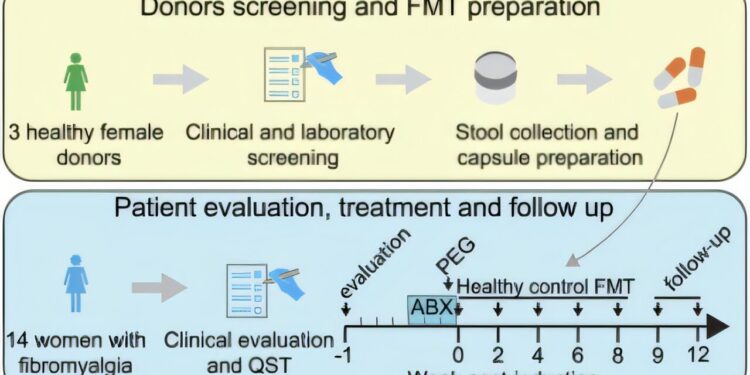Schematic representation of the design of the study. Credit: Neuron (2025). DOI: 10.1016 / J. ENERON.2025.03.032
Research led by McGill University has discovered that transplantation of the intestinal microbiota of women with fibromyalgia in mice induced pain, immune activation, metabolomic changes and reduced skin innervation.
The exact cause of fibromyalgia is unknown. Fibromyalgia affects 2% to 4% of the population, mainly women, and is characterized by common chronic pain, fatigue, sleep disturbances and cognitive difficulties. Most patients suffer from significant symptoms that have a negative impact on quality of life.
The deregulated activity of the central nervous system, modified neurotransmitters, neuroinflammation and a density of reduced intrapidermal nerve fibers have been observed in patients with fibromyalgia. Functional gastrointestinal disorders and depression are also common.
Previous studies have revealed that the composition of the intestinal microbiota differs between women with fibromyalgia and healthy controls, but the link between this altered microbiota and any functional role that it could play remains a mystery.
In the study, “the intestinal microbiota promotes pain in fibromyalgia”, published in NeuronResearchers conducted a fecal microbiotic microbiota transplant study to determine whether the intestinal microbiota microbiota of fibromyalgia may cause related pain and symptoms.
The researchers carried out a transplant of Fécale microbiota (FMT) in female germ mice using samples taken from women with fibromyalgia and healthy witnesses paired by age. An open clinical trial registered 14 women with severe fibromyalgia that received five doses of oral fmt of healthy donors.
To assess pain and systemic changes in mice, the study used behavioral tests, unique RNA sequencing, metabolomic profiling, calcium imagery of the backpack nodes and the analysis of the vertebral microglie. Clinical participants have received bihebdodaires FMT oral capsules for five doses after preparing for antibiotic and intestinal cleaning.
Mouses that received microbiota from fibromyalgia patients have developed mechanical, heat and cold hypersensitivity, spontaneous pain and muscle pain in four weeks. Persistent pain and depression type behaviors were observed in mice four months after transplantation.
The changes have coincided with the alteration of the composition of the intestinal microbiota, immune activation marked by conventional monocytes and vertebral microglies, changes in the metabolism of amino acids and bile acids, and a reduction in intrapidermal density of nerve fibers. Replacement of the microbiota associated with fibromyalgia with that of healthy donors has reversed pain hypersensitivity. Supplementation in oral bile acids has also reduced pain responses in mice.
In the human clinical study, 14 women with severe and treatment -resistant fibromyalgia received an FMT of healthy donors. After treatment, 12 participants reported a clinically significant reduction in pain.
Improvements, although they were not complete, were observed in the overall load of symptoms, sleep quality, anxiety and depression scores. Quantitative sensory tests have shown a reduction in hypersensitivity of cold pain. The analysis of the stools confirmed a successful bacterial transplant of healthy donors.
Based on the results, intestinal microbiota alterations can play a causal role in the development of pain and other symptoms associated with fibromyalgia. Because the human trial was open, had no control arms and had only scored women, the results are preliminary and need confirmation in randomized controlled trials.
The modulation of the intestinal microbiota by fecal transplantation presents a potential therapeutic strategy for people suffering from this chronic pain syndrome. The establishment of the functional significance of the intestinal microbiota in fibromyalgia would open up new opportunities to assess microbial interventions.
More information:
Weihua Cai et al, the intestinal microbiota promotes pain in fibromyalgia, Neuron (2025). DOI: 10.1016 / J. ENERON.2025.03.032
© 2025 Science X Network
Quote: Mice develop fibromyalgia type pain after receiving intestinal microbiota from human patients (2025, April 29) recovered on April 29, 2025 from
This document is subject to copyright. In addition to any fair program for private or research purposes, no part can be reproduced without written authorization. The content is provided only for information purposes.



